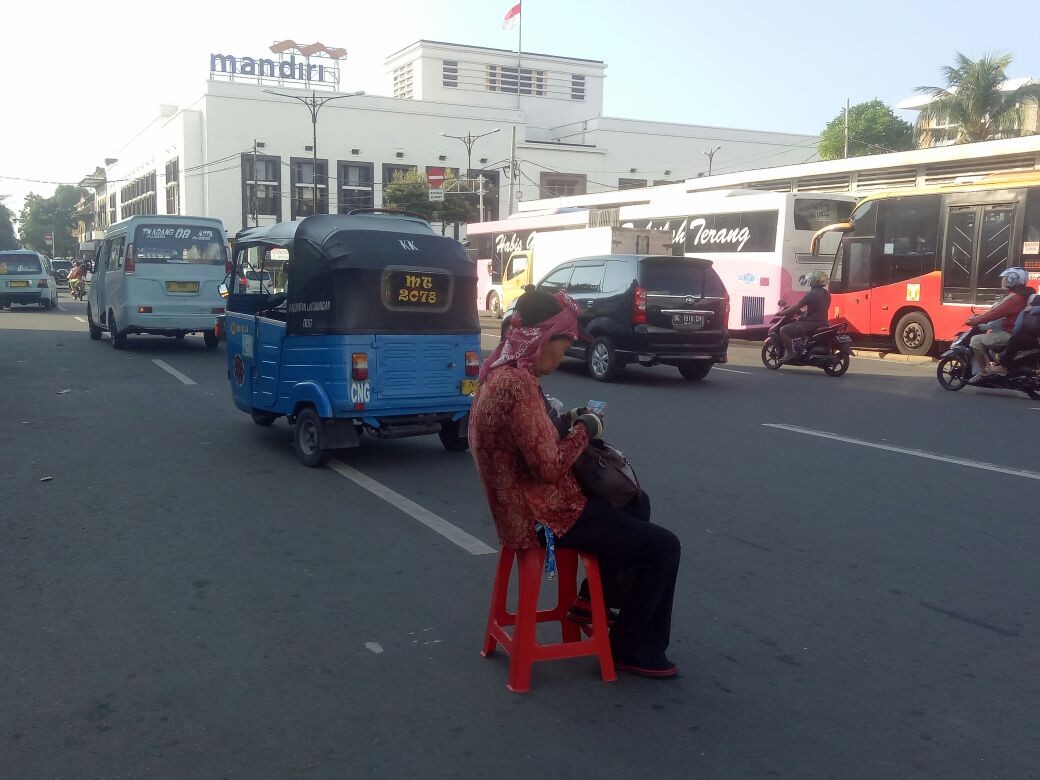Popular Reads
Top Results
Can't find what you're looking for?
View all search resultsPopular Reads
Top Results
Can't find what you're looking for?
View all search resultsSmall time Idul Fitri ‘money changers’ squeezed out by big players
Change text size
Gift Premium Articles
to Anyone
M
arni Tambunan, stands on the sidewalk of Jalan Metro Pondok Indah, South Jakarta, waving a wad of crispy cash, lots of them, to passing motorists. For the past six years, during the Idul Fitri holidays, the 46-year-old woman has been offering the service to change people’s money into smaller denominations.
The small bills are crucial for people celebrating Idul Fitri as gift, especially for children.
Marni is part of an army of “money changers”, people offering to break your big notes into smaller bills, who are lining up the major roads leading out of Jakarta and other big cities, hoping to nail revellers going to their rural villagers to celebrate Idul Fitri. They can also be found at bus terminals and train stations as millions of people are joining to Idul Fitri exodus to rural home villages.
The money changers charge a 10 percent commission. For example, to break a Rp 100,000 bill into Rp 20,000, Rp 10,000 or Rp 5,000 denominations, you would have to pay a Rp 10,000 service fee on top. This sounds like a good business indeed.
But they are increasingly feeling the pinch of competition, not just from other money changers, but more so from the big boys: Commercial banks and even the central bank, are offering similar services, for free.
Marni's operation is not exactly a private initiative.
“My capital comes from a cukong,” she said on Monday, using the popular term for a Chinese-Indonesian financier.
She keeps 40 percent of the profit, and gives the rest to the cukong.
Marni notices that business keeps slowing down with each passing year.
“How can I enjoy profit with only two customers a day?” she said, noting that most people prefer to break their money at banks.
Hundreds others like her —sprawling in other areas such as Harmoni and Jakarta Kota train station in Central Jakarta—are experiencing similar challenge. Business has been slow.
The biggest culprit, as far as they are concerned, is Bank Indonesia, the central bank, which runs several money changing services in the city. One of them is at the IRTI parking lot in the National Monument (Monas) compound.
This year, Bank Indonesia's keeps this particular service running all the way until Tuesday, the last day of Ramadhan before Idul Fitri celebrations. Most of its other activities ceased during the week since Monday, but some small services remain, including the money changing services of Bank Indonesia.
For this year's Idul Fitri, the central bank has prepared Rp 160 trillion in small denominations to meet demand.
Still, there will always be people who just would not have the time to go to Bank Indonesia's service points and have to turn to the amateur money changers, as long as they would not mind paying the 10 percent commission.
Fourty-year-old Iwan was one of them. The Jakarta Post found him exchanging Rp 200,000 into 20 banknotes of crisp Rp 10,000 bills in front of Jakarta Kota train station on Monday.
He was returning to his hometown in Indramayu, West Java, and was hurrying to catch his train.
“This is the first time I used the services of a street money changer. Usually, I would go to a bank,” Iwan said. (mos/tas)










